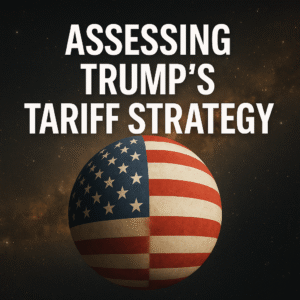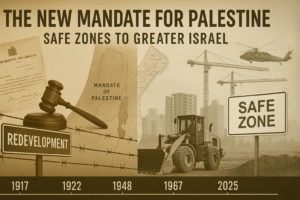Geopolitical Briefing: Palestine – 31 August 2025
- Israel intensifies operations around Gaza City, designates the area a “dangerous combat zone,” halts aid pauses, and convenes the security cabinet to plan a seizure of the city; dozens reported killed, including near an aid site. (Reuters, The Guardian)
- Hamas leadership shift: the movement publicly confirms the death of Gaza military commander Mohammed Sinwar; Israel separately claims to have killed Qassam Brigades spokesman Abu Ubaida. (Reuters, AP News)
- A Washington Post–reported “GREAT Trust” post-war blueprint surfaces, proposing a U.S.-administered trusteeship of Gaza for ~10 years with temporary/“voluntary” relocation of residents and tokenized land rights; Reuters corroborates key details. (The Washington Post, Reuters)
- Recognition vs. annexation track: London signals it still intends to recognise a Palestinian state in September as Israel weighs West Bank annexation in response to such moves by Western capitals. (The Guardian, Reuters)
- Aid access and pressure campaigns: WFP warns Gaza City’s combat-zone designation will curtail food access; a large activist flotilla departs Barcelona to challenge the naval blockade and deliver aid. (Reuters)
Israel’s step-up around Gaza City—labeling it a combat zone, ending pauses, and preparing a cabinet-approved plan to seize the urban core—signals a multi-week shaping phase before a larger push. The reported fatalities near an aid site underline the escalated civilian risk profile and the growing friction at humanitarian distribution points, increasing displacement pressures as residents attempt to move south through already-overcrowded corridors. The security cabinet’s agenda notably centers on expanding operations rather than truce mechanics, suggesting that leverage through force remains the near-term instrument of policy. (Reuters, The Guardian)
Hamas’s confirmation of Mohammed Sinwar’s death (after months of ambiguity) clarifies succession dynamics and likely elevates field-level deputies, with implications for cohesion and command-and-control across Gaza’s zones. In parallel, Israel’s claim to have killed Abu Ubaida—unconfirmed by Hamas at time of reporting—targets the movement’s information and mobilization apparatus. Together, these developments could complicate internal messaging and negotiations while incentivising dispersed operational autonomy on the ground. (Reuters, AP News)
The “GREAT Trust” concept—U.S. administration of Gaza for at least a decade, temporary/“voluntary” relocation, and tokenized redevelopment rights—marks a significant escalation in externally driven end-state proposals. Beyond feasibility questions, the scheme raises serious legal and legitimacy concerns around displacement, property, and governance, and would deepen contestation with international agencies now documenting famine. Even as backers frame it as reconstruction, the political cost among Palestinians and many states would be considerable, and implementation would require regional buy-in that currently appears absent. (The Washington Post, Reuters)
On the diplomatic front, the U.K.’s signal that it still intends September recognition of Palestinian statehood, alongside France and others, is meeting an Israeli counter-move: open consideration of annexation steps in the West Bank. This tit-for-tat trajectory hardens positions ahead of the U.N. General Assembly, narrows space for de-escalatory bargains, and raises the stakes for third-party guarantors weighing costs of recognition versus the legal/diplomatic fallout of annexation. (The Guardian, Reuters)
Operationally, humanitarian access is set to worsen if Gaza City’s combat-zone designation constrains deliveries, a risk highlighted by WFP leadership. Civil-society pressure is mounting in response: the Barcelona-based flotilla aims to test the blockade’s legal-political perimeter and keep Gaza’s famine and access restrictions high on Western agendas. Whether it shifts policy is uncertain, but it adds international visibility as aid agencies warn the situation will deteriorate without a sustained ceasefire and protected corridors. (Reuters)


